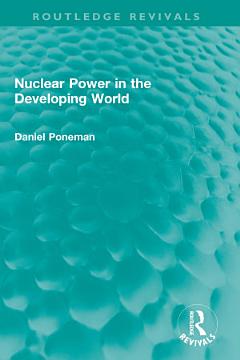Nuclear Power in the Developing World (1982) explores the issue of nuclear power policies in developing countries. The sharp oil price rises of the 1970s attracted widespread attention to nuclear power as an alternative energy source, while some developing countries began attaining the technological ability to develop nuclear weapons programmes. While the search for energy should not be thwarted, the quest for nuclear weapons should not be promoted. The tension between these two goals has often led to confused export policies in the nuclear supplier nations. The author attacks this confusion at its source by examining first-hand the motives which drive nuclear policies in the developing world. He explores how security and economic objectives, domestic policies and foreign influence shape nuclear policies, enriching his analysis with examples from South American, African and Asian experiences. This volume also takes into account those without active nuclear programmes, to better understand how such programmes are born. This approach demonstrates that countries such as India, Pakistan and Argentina entertain different priorities from countries such as Brazil, Taiwan and the Philippines in promoting nuclear power.

